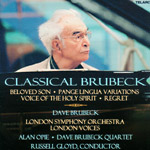Best known for his jazz compositions–some of which are considered “classics”–Dave Brubeck also has a number of purely classical compositions under his belt. However, owing to the fact that Brubeck is a devoutly religious man, and given the nature of the music on this release, a better title might have been “Sacred Brubeck”. Opening the program is Beloved Son, an Easter oratorio based on verses by Lutheran poet Dr. Herbert Brokering. Dissonant chromatic meanderings reminiscent of Britten’s War Requiem usher in a gloomy atmosphere that, though occasionally balanced by lighter passages, doesn’t really disperse until the jazz combo enters halfway into the third movement (“Rabboni”). Then things get hopping with an old-style gospel revival that actually turns out to be a rather heavy-handed celebration, as the frenzied chorus seems to be trying to shout down the jazzmen. In his Mass, Leonard Bernstein displayed remarkable skill at weaving together popular and “serious” elements, but Brubeck’s collage-like layering makes his work sound more like Charles Ives than he probably intended.
Pange Lingua Variations is considerably more intriguing, with its fresher and more lively choral writing and its clever inventions on the well-known Gregorian hymn, here rendered in plainchant. Things begin to get a bit weighty about halfway into the piece, but happily at this point the jazz quartet clears the air with its raucous “Thus on the Night” variation.
Voice of the Holy Spirit (based on the book of Acts) features a substantial and well written solo baritone part (sung handsomely by Alan Opie). Though the opening and closing music harks back to the 19th century oratorios of Brahms and Mendelssohn, the work’s center is certifiably contemporary, especially Tongues of Fire, where the jazz combo cuts loose with some wicked improvisations illustrating Christ’s disciples’ miraculous sudden ability to preach in multiple languages.
Finally, Brubeck’s Regret, with its scoring for strings and piano, is the briefest but in some ways most compelling work in this set. A melancholy string melody generates much feeling before the piano enters with some brilliant yet touching improvisatory material, creating an atmosphere not dissimilar to that encountered in many a cinematic love story.
The performers acquit themselves handsomely. Both Opie and soprano Thomasin Trezise make impressive contributions to Beloved Son, and conductor Russell Gloyd leads his combined choral and orchestral forces in polished, professional performances. And of course, there’s the Dave Brubeck Quartet, which plays with the same imagination and infectious energy that characterized the group’s legendary early days. Telarc’s recording does a good job of balancing the various performing constituents (though I wonder if the jazz combo really would sound that prominent next to an orchestra and choir). Although Brubeck’s core jazz fans may not get much enjoyment from this mostly heavy and decidedly un-hip music, for classical listeners, well, if you’re curious to hear what kind of oratorios a proficient, classically savvy “jazz guy” would write, then by all means take a listen.
































